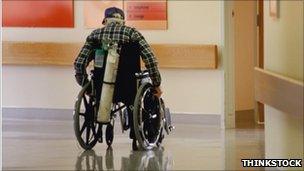North/South spending divide in social care
- Published
- comments

Charities fear that adult social services will be cut
The government narrative around cuts to English council budgets is that there's no reason why front-line services should suffer if local politicians reduce waste and improve efficiency. In other words: "If you don't like what's happening, blame them - not us!"
That is why, I think, ministers are irritated by the findings of today's BBC/CIPFA survey suggesting a North-South divide in what is happening to spending on Adult Social Services. Draw a line from the Bristol Channel to the Wash and above it budgets have been reduced by almost 5%, below it spending has increased by nearly 3%.
Yes, according to data verified by the Chartered Institute of Public Finance and Accountancy, it is a story of cuts in the North and more cash in the South.
This clear disparity points less to the relative efficiency of individual local authorities and more to the regional consequences of the coalition government's spending review.
Councils in the Midlands and the North have historically been more reliant on central grants to deal with the social needs that have flowed from industrial decline. The wealthier south sees a greater proportion of local authority income coming from council tax.
Regional variations
Government ministers believe that the Blair/Brown administrations were overly generous to the former, inventing new grants for social problems on top of a basic settlement that already took account of deprivation.
These councils, of course, were often in Labour's political heartlands. So the new settlement has been deliberately engineered to "unwind" some of the redistributive power of previous budgets.
In that sense, there is no surprise in finding a disparity in the consequences of the settlement between north and south in England. What is a shock is the claim that budgets on adult social services are actually increasing in better off southern neighbourhoods as poorer northern areas seek significant savings. If true, there may be longer-term social consequences of this variation in investment.
This week I have visited two English counties: Lancashire, where the council is looking to save millions in its spending on vulnerable adults; and Wiltshire, where the authority is planning to spend millions more. Both authorities, incidentally, are Conservative controlled.
Lancashire Council is among 15 English authorities that are changing the threshold for support from those with "moderate" needs to cover only those with "critical" or "substantial" problems.
Cutting bureaucracy
Some 3,900 people in the county fear they may lose their care package, including Margaret Cropper who I met in Preston.
She has cerebral palsy and currently has a personal assistant to give her, as she puts it, "a life rather than an existence". Her helper not only assists her getting in and out of bed, dressing and washing, but also ensures she can get out of her home to go shopping and to socialise.

Adult social care budgets vary from region to region
"I am afraid my ability to keep a reasonable house, to meet friends, to have a normal life - that, I think, will be seriously curtailed or stopped altogether", she told me.
It was a very different story in Wiltshire where I was shown around a new care home due to welcome residents next month. The facility offers top-of-the-range accommodation and support as part of expanding provision for vulnerable adults in the county.
John Thomson, Conservative deputy leader, says they have freed up more than £8m to invest in adult social care because of a reorganisation conducted two years ago. Counter to Tory policy nationally, Wiltshire councillors agreed to abolish four district councils and merge into one unitary authority - saving a fortune in bureaucracy but cutting a deal with the then Labour government that none of its central funding would be reduced.
According to the government's figures on the impact of its current settlement, Wiltshire has seen a relatively modest reduction in its spending power of 2.27% while many more deprived areas have seen a fall of up to 8.8%. Lancashire's reduction is put at 3.07%.
Vulnerable adults
Mr Thomson claims they have been able to increase spending on adult social care because they have made it a priority and have been successful in reducing back-office costs. Wiltshire might also count itself lucky that the current cuts have not eaten into the savings it made after reorganisation in 2009.
According to new figures from the Association of Directors of Adult Social Services (ADASS), also published today, councils across England intend to reduce spending on adult social care by £1bn in the coming year, warning that these cuts will create new "gaps" in funding and that "savings on this scale simply cannot be achieved through doing the same things more efficiently or by trimming management costs".
Using a different methodology to CIPFA, the ADASS survey finds spending reductions across the country but confirms the regional spending divide: the north is making deeper cuts than the south.
The organisation is urging ministers to use the current pause in plans for NHS reform in England to include the findings of the Dilnot Commission into social care which is due to report in the summer.
The government points out that it is committed to spending an extra £2bn by 2014 to improve adult social care in England and insists that the issue is not "unfairness" in the settlement but the efficiency of individual authorities.
What the ADASS research suggests is that two-thirds of savings are down to improved efficiency, but a quarter of the £1bn is cuts to front line services.
The real challenge is not in trying to make social care more efficient, focusing on prevention rather than expensive institutional support. Nor is it inflicting a "Calgon-moment" on systems that have inevitably become calcified over the years.
The problem is not the destination but the journey. How can we best protect vulnerable adults in some of the most deprived parts of England as all this change takes place?